BSc Business Management: Analyzing Factors Affecting Global Economy
VerifiedAdded on 2023/06/14
|10
|2849
|402
Essay
AI Summary
This essay examines the factors influencing international business growth within the global economy, focusing on aspects such as political and economic environments, socio-economic cultures, and technological developments. It uses Tesco, a UK-based multinational retailer, as a case study to illustrate these factors. The essay discusses the impact of trade barriers, economic policies, inflation, social factors like changing consumer preferences, and technological advancements on international trade. It also addresses the opportunities and challenges faced by small and medium enterprises in the global market, the role of organizations like the World Trade Organization, and the effects of currency fluctuations and trade liberalization on international business. The conclusion emphasizes the importance of reducing trade restrictions and fostering international cooperation to promote global trade and development.
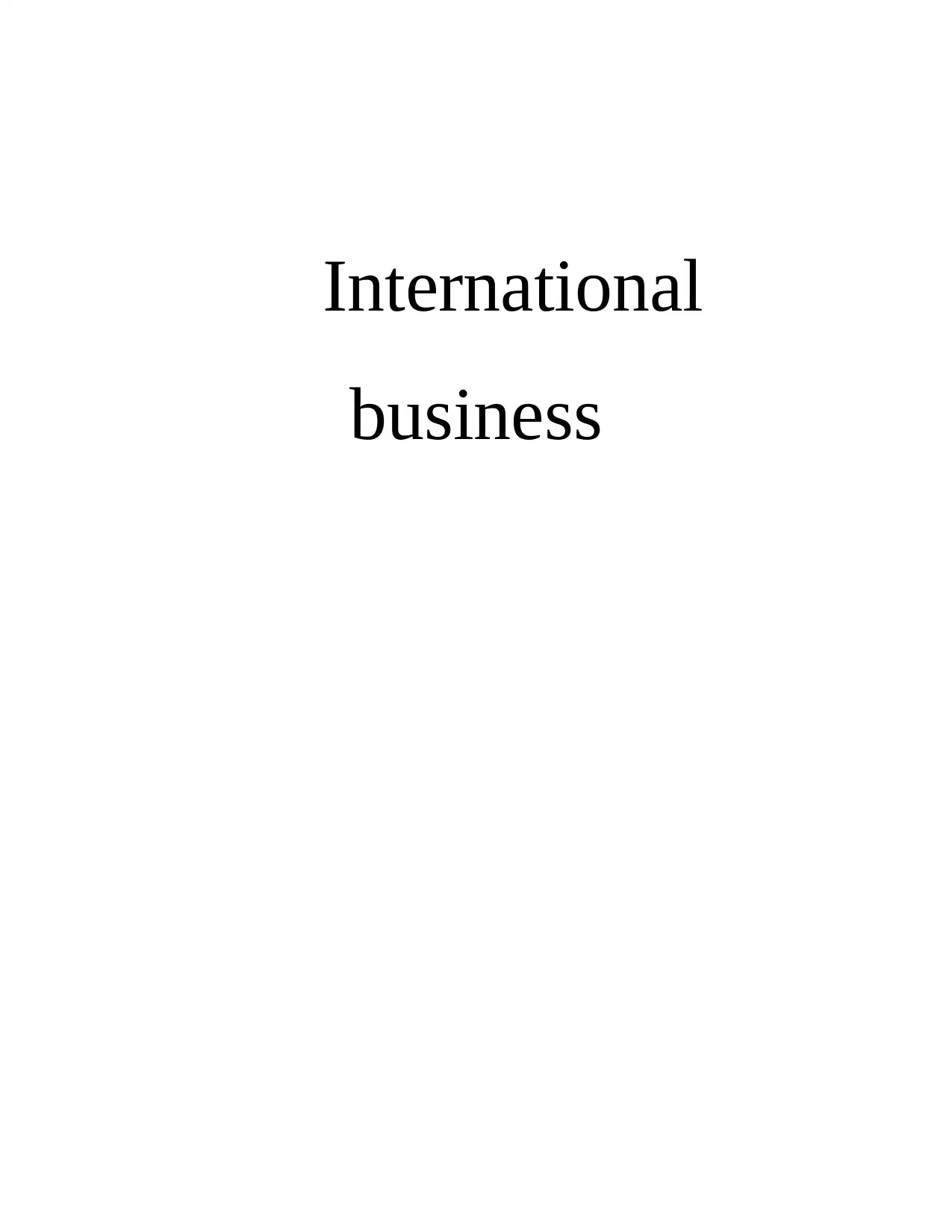
International
business
business
Paraphrase This Document
Need a fresh take? Get an instant paraphrase of this document with our AI Paraphraser
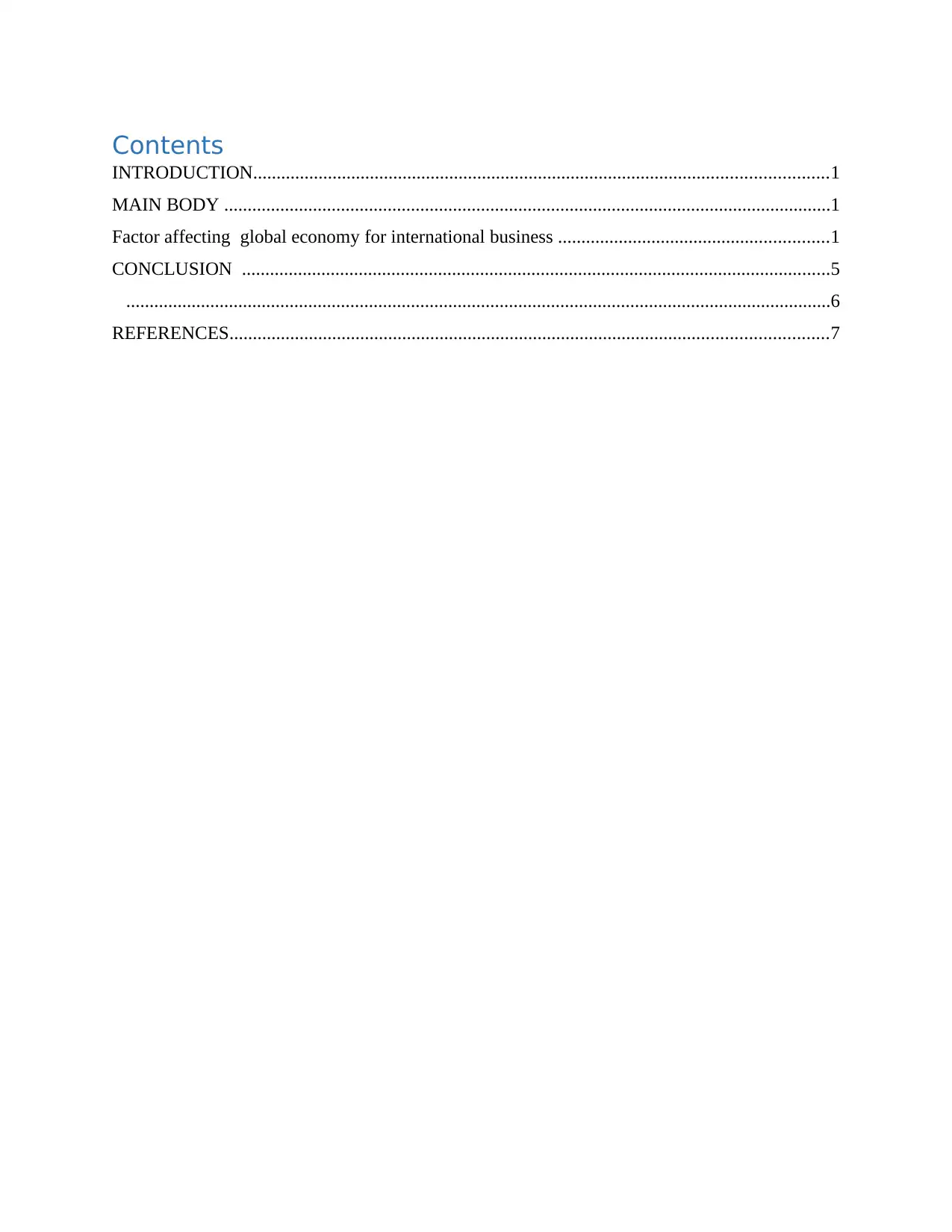
Contents
INTRODUCTION...........................................................................................................................1
MAIN BODY ..................................................................................................................................1
Factor affecting global economy for international business ..........................................................1
CONCLUSION ..............................................................................................................................5
.......................................................................................................................................................6
REFERENCES................................................................................................................................7
INTRODUCTION...........................................................................................................................1
MAIN BODY ..................................................................................................................................1
Factor affecting global economy for international business ..........................................................1
CONCLUSION ..............................................................................................................................5
.......................................................................................................................................................6
REFERENCES................................................................................................................................7
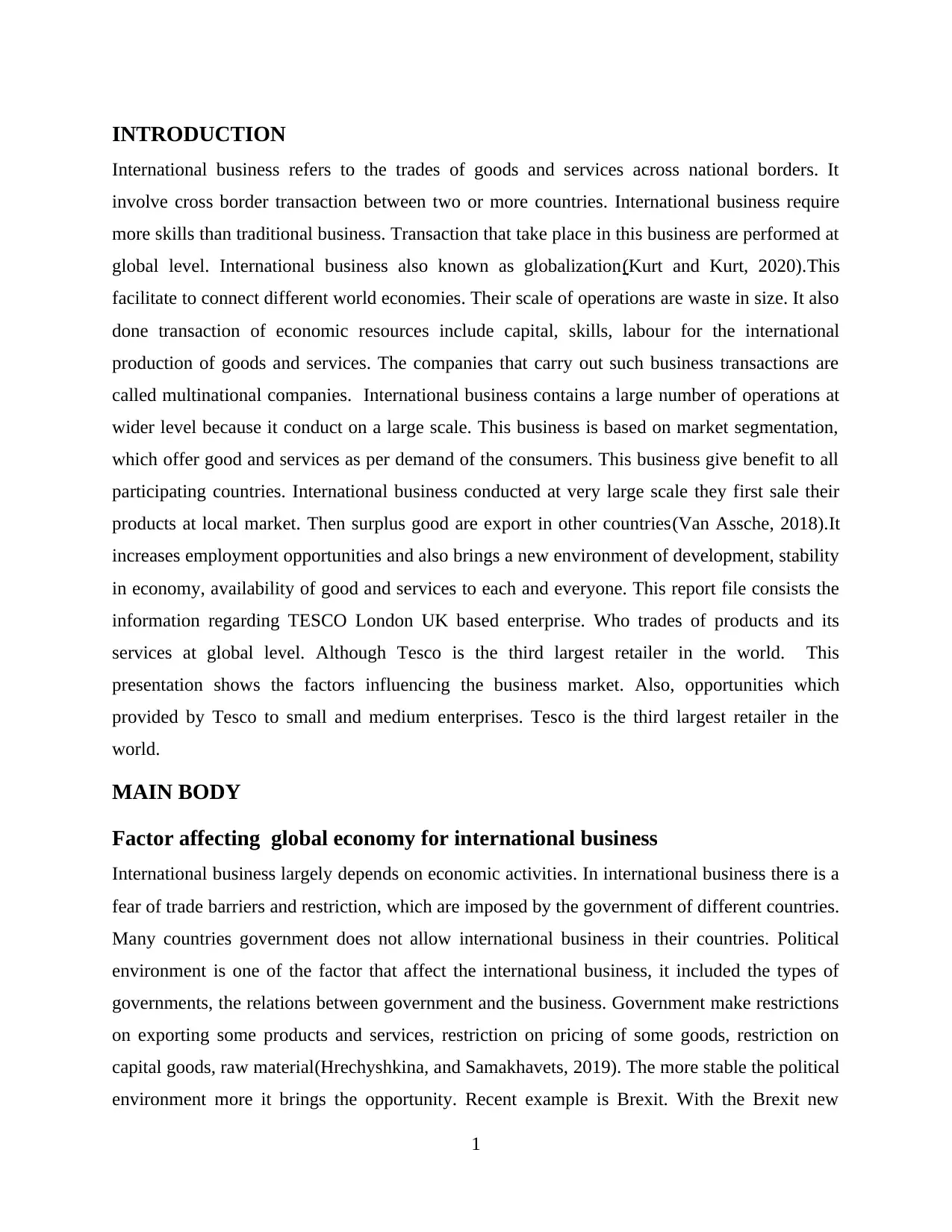
INTRODUCTION
International business refers to the trades of goods and services across national borders. It
involve cross border transaction between two or more countries. International business require
more skills than traditional business. Transaction that take place in this business are performed at
global level. International business also known as globalization(Kurt and Kurt, 2020).This
facilitate to connect different world economies. Their scale of operations are waste in size. It also
done transaction of economic resources include capital, skills, labour for the international
production of goods and services. The companies that carry out such business transactions are
called multinational companies. International business contains a large number of operations at
wider level because it conduct on a large scale. This business is based on market segmentation,
which offer good and services as per demand of the consumers. This business give benefit to all
participating countries. International business conducted at very large scale they first sale their
products at local market. Then surplus good are export in other countries(Van Assche, 2018).It
increases employment opportunities and also brings a new environment of development, stability
in economy, availability of good and services to each and everyone. This report file consists the
information regarding TESCO London UK based enterprise. Who trades of products and its
services at global level. Although Tesco is the third largest retailer in the world. This
presentation shows the factors influencing the business market. Also, opportunities which
provided by Tesco to small and medium enterprises. Tesco is the third largest retailer in the
world.
MAIN BODY
Factor affecting global economy for international business
International business largely depends on economic activities. In international business there is a
fear of trade barriers and restriction, which are imposed by the government of different countries.
Many countries government does not allow international business in their countries. Political
environment is one of the factor that affect the international business, it included the types of
governments, the relations between government and the business. Government make restrictions
on exporting some products and services, restriction on pricing of some goods, restriction on
capital goods, raw material(Hrechyshkina, and Samakhavets, 2019). The more stable the political
environment more it brings the opportunity. Recent example is Brexit. With the Brexit new
1
International business refers to the trades of goods and services across national borders. It
involve cross border transaction between two or more countries. International business require
more skills than traditional business. Transaction that take place in this business are performed at
global level. International business also known as globalization(Kurt and Kurt, 2020).This
facilitate to connect different world economies. Their scale of operations are waste in size. It also
done transaction of economic resources include capital, skills, labour for the international
production of goods and services. The companies that carry out such business transactions are
called multinational companies. International business contains a large number of operations at
wider level because it conduct on a large scale. This business is based on market segmentation,
which offer good and services as per demand of the consumers. This business give benefit to all
participating countries. International business conducted at very large scale they first sale their
products at local market. Then surplus good are export in other countries(Van Assche, 2018).It
increases employment opportunities and also brings a new environment of development, stability
in economy, availability of good and services to each and everyone. This report file consists the
information regarding TESCO London UK based enterprise. Who trades of products and its
services at global level. Although Tesco is the third largest retailer in the world. This
presentation shows the factors influencing the business market. Also, opportunities which
provided by Tesco to small and medium enterprises. Tesco is the third largest retailer in the
world.
MAIN BODY
Factor affecting global economy for international business
International business largely depends on economic activities. In international business there is a
fear of trade barriers and restriction, which are imposed by the government of different countries.
Many countries government does not allow international business in their countries. Political
environment is one of the factor that affect the international business, it included the types of
governments, the relations between government and the business. Government make restrictions
on exporting some products and services, restriction on pricing of some goods, restriction on
capital goods, raw material(Hrechyshkina, and Samakhavets, 2019). The more stable the political
environment more it brings the opportunity. Recent example is Brexit. With the Brexit new
1
⊘ This is a preview!⊘
Do you want full access?
Subscribe today to unlock all pages.

Trusted by 1+ million students worldwide
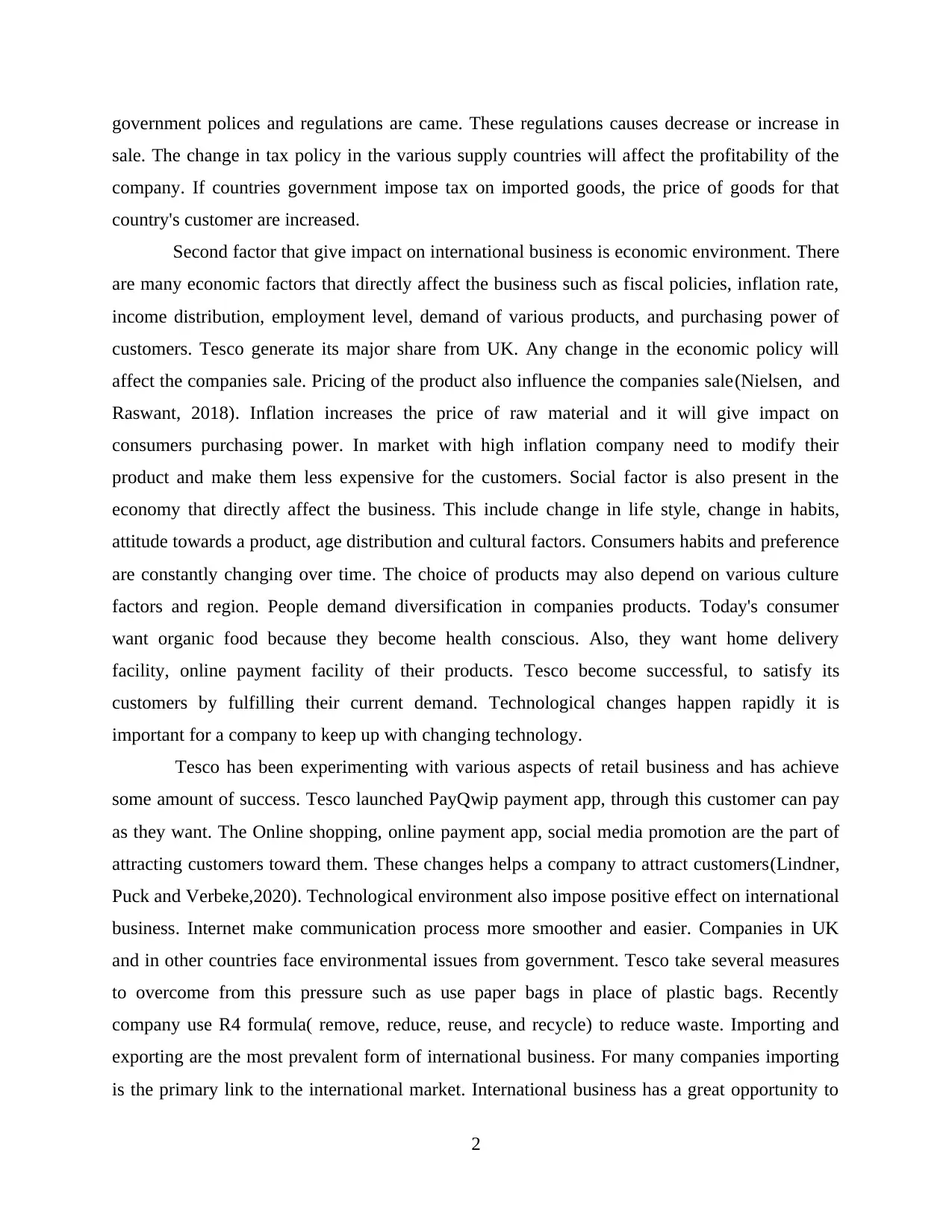
government polices and regulations are came. These regulations causes decrease or increase in
sale. The change in tax policy in the various supply countries will affect the profitability of the
company. If countries government impose tax on imported goods, the price of goods for that
country's customer are increased.
Second factor that give impact on international business is economic environment. There
are many economic factors that directly affect the business such as fiscal policies, inflation rate,
income distribution, employment level, demand of various products, and purchasing power of
customers. Tesco generate its major share from UK. Any change in the economic policy will
affect the companies sale. Pricing of the product also influence the companies sale(Nielsen, and
Raswant, 2018). Inflation increases the price of raw material and it will give impact on
consumers purchasing power. In market with high inflation company need to modify their
product and make them less expensive for the customers. Social factor is also present in the
economy that directly affect the business. This include change in life style, change in habits,
attitude towards a product, age distribution and cultural factors. Consumers habits and preference
are constantly changing over time. The choice of products may also depend on various culture
factors and region. People demand diversification in companies products. Today's consumer
want organic food because they become health conscious. Also, they want home delivery
facility, online payment facility of their products. Tesco become successful, to satisfy its
customers by fulfilling their current demand. Technological changes happen rapidly it is
important for a company to keep up with changing technology.
Tesco has been experimenting with various aspects of retail business and has achieve
some amount of success. Tesco launched PayQwip payment app, through this customer can pay
as they want. The Online shopping, online payment app, social media promotion are the part of
attracting customers toward them. These changes helps a company to attract customers(Lindner,
Puck and Verbeke,2020). Technological environment also impose positive effect on international
business. Internet make communication process more smoother and easier. Companies in UK
and in other countries face environmental issues from government. Tesco take several measures
to overcome from this pressure such as use paper bags in place of plastic bags. Recently
company use R4 formula( remove, reduce, reuse, and recycle) to reduce waste. Importing and
exporting are the most prevalent form of international business. For many companies importing
is the primary link to the international market. International business has a great opportunity to
2
sale. The change in tax policy in the various supply countries will affect the profitability of the
company. If countries government impose tax on imported goods, the price of goods for that
country's customer are increased.
Second factor that give impact on international business is economic environment. There
are many economic factors that directly affect the business such as fiscal policies, inflation rate,
income distribution, employment level, demand of various products, and purchasing power of
customers. Tesco generate its major share from UK. Any change in the economic policy will
affect the companies sale. Pricing of the product also influence the companies sale(Nielsen, and
Raswant, 2018). Inflation increases the price of raw material and it will give impact on
consumers purchasing power. In market with high inflation company need to modify their
product and make them less expensive for the customers. Social factor is also present in the
economy that directly affect the business. This include change in life style, change in habits,
attitude towards a product, age distribution and cultural factors. Consumers habits and preference
are constantly changing over time. The choice of products may also depend on various culture
factors and region. People demand diversification in companies products. Today's consumer
want organic food because they become health conscious. Also, they want home delivery
facility, online payment facility of their products. Tesco become successful, to satisfy its
customers by fulfilling their current demand. Technological changes happen rapidly it is
important for a company to keep up with changing technology.
Tesco has been experimenting with various aspects of retail business and has achieve
some amount of success. Tesco launched PayQwip payment app, through this customer can pay
as they want. The Online shopping, online payment app, social media promotion are the part of
attracting customers toward them. These changes helps a company to attract customers(Lindner,
Puck and Verbeke,2020). Technological environment also impose positive effect on international
business. Internet make communication process more smoother and easier. Companies in UK
and in other countries face environmental issues from government. Tesco take several measures
to overcome from this pressure such as use paper bags in place of plastic bags. Recently
company use R4 formula( remove, reduce, reuse, and recycle) to reduce waste. Importing and
exporting are the most prevalent form of international business. For many companies importing
is the primary link to the international market. International business has a great opportunity to
2
Paraphrase This Document
Need a fresh take? Get an instant paraphrase of this document with our AI Paraphraser
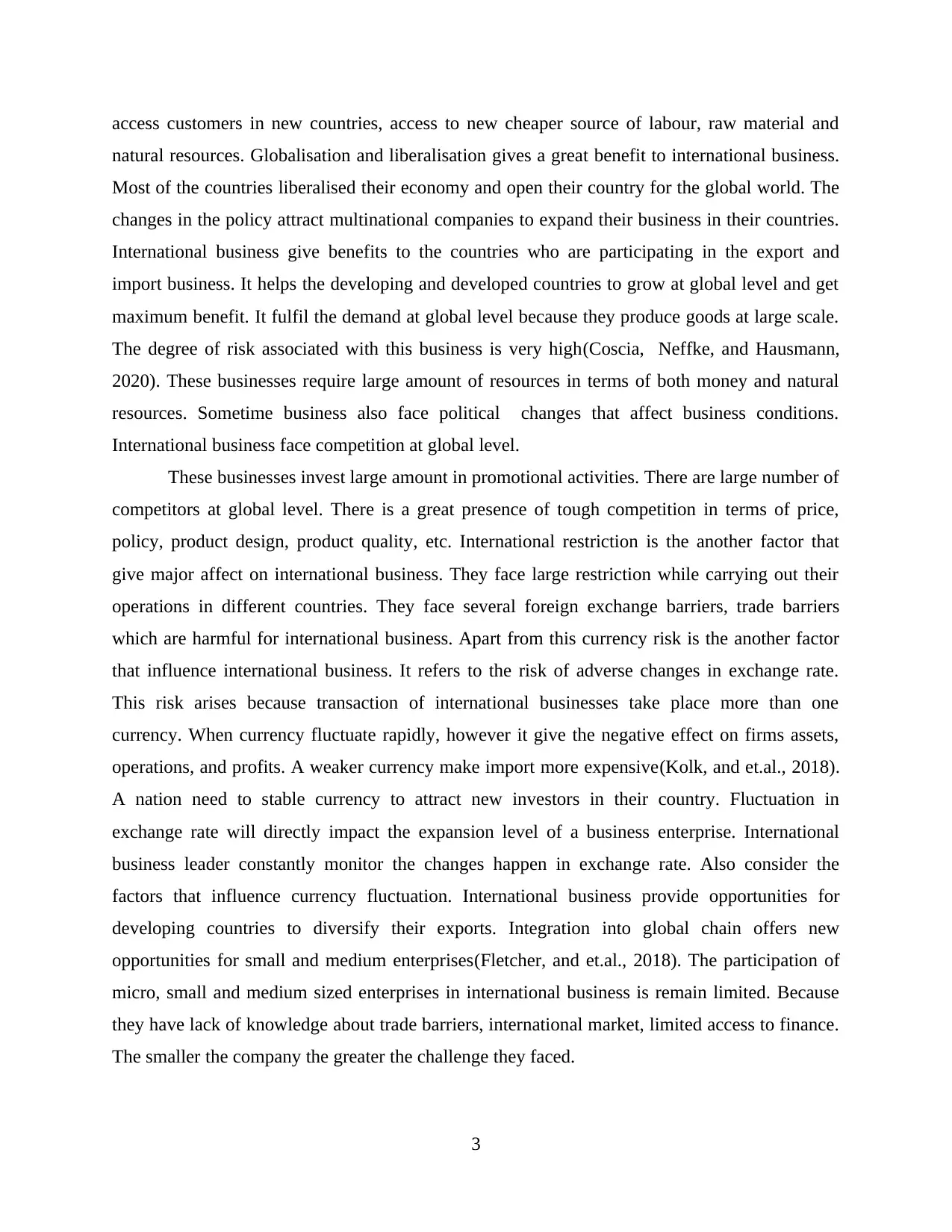
access customers in new countries, access to new cheaper source of labour, raw material and
natural resources. Globalisation and liberalisation gives a great benefit to international business.
Most of the countries liberalised their economy and open their country for the global world. The
changes in the policy attract multinational companies to expand their business in their countries.
International business give benefits to the countries who are participating in the export and
import business. It helps the developing and developed countries to grow at global level and get
maximum benefit. It fulfil the demand at global level because they produce goods at large scale.
The degree of risk associated with this business is very high(Coscia, Neffke, and Hausmann,
2020). These businesses require large amount of resources in terms of both money and natural
resources. Sometime business also face political changes that affect business conditions.
International business face competition at global level.
These businesses invest large amount in promotional activities. There are large number of
competitors at global level. There is a great presence of tough competition in terms of price,
policy, product design, product quality, etc. International restriction is the another factor that
give major affect on international business. They face large restriction while carrying out their
operations in different countries. They face several foreign exchange barriers, trade barriers
which are harmful for international business. Apart from this currency risk is the another factor
that influence international business. It refers to the risk of adverse changes in exchange rate.
This risk arises because transaction of international businesses take place more than one
currency. When currency fluctuate rapidly, however it give the negative effect on firms assets,
operations, and profits. A weaker currency make import more expensive(Kolk, and et.al., 2018).
A nation need to stable currency to attract new investors in their country. Fluctuation in
exchange rate will directly impact the expansion level of a business enterprise. International
business leader constantly monitor the changes happen in exchange rate. Also consider the
factors that influence currency fluctuation. International business provide opportunities for
developing countries to diversify their exports. Integration into global chain offers new
opportunities for small and medium enterprises(Fletcher, and et.al., 2018). The participation of
micro, small and medium sized enterprises in international business is remain limited. Because
they have lack of knowledge about trade barriers, international market, limited access to finance.
The smaller the company the greater the challenge they faced.
3
natural resources. Globalisation and liberalisation gives a great benefit to international business.
Most of the countries liberalised their economy and open their country for the global world. The
changes in the policy attract multinational companies to expand their business in their countries.
International business give benefits to the countries who are participating in the export and
import business. It helps the developing and developed countries to grow at global level and get
maximum benefit. It fulfil the demand at global level because they produce goods at large scale.
The degree of risk associated with this business is very high(Coscia, Neffke, and Hausmann,
2020). These businesses require large amount of resources in terms of both money and natural
resources. Sometime business also face political changes that affect business conditions.
International business face competition at global level.
These businesses invest large amount in promotional activities. There are large number of
competitors at global level. There is a great presence of tough competition in terms of price,
policy, product design, product quality, etc. International restriction is the another factor that
give major affect on international business. They face large restriction while carrying out their
operations in different countries. They face several foreign exchange barriers, trade barriers
which are harmful for international business. Apart from this currency risk is the another factor
that influence international business. It refers to the risk of adverse changes in exchange rate.
This risk arises because transaction of international businesses take place more than one
currency. When currency fluctuate rapidly, however it give the negative effect on firms assets,
operations, and profits. A weaker currency make import more expensive(Kolk, and et.al., 2018).
A nation need to stable currency to attract new investors in their country. Fluctuation in
exchange rate will directly impact the expansion level of a business enterprise. International
business leader constantly monitor the changes happen in exchange rate. Also consider the
factors that influence currency fluctuation. International business provide opportunities for
developing countries to diversify their exports. Integration into global chain offers new
opportunities for small and medium enterprises(Fletcher, and et.al., 2018). The participation of
micro, small and medium sized enterprises in international business is remain limited. Because
they have lack of knowledge about trade barriers, international market, limited access to finance.
The smaller the company the greater the challenge they faced.
3
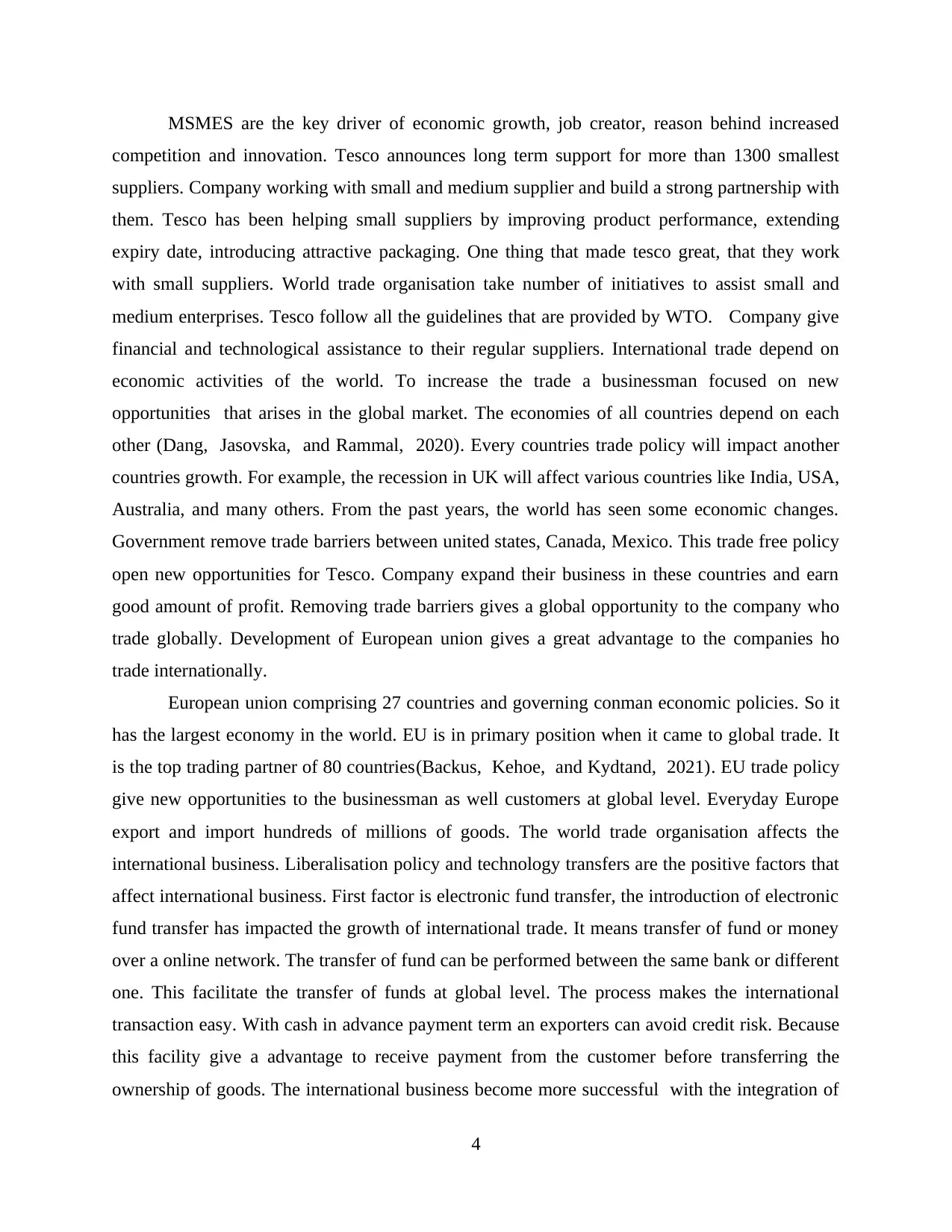
MSMES are the key driver of economic growth, job creator, reason behind increased
competition and innovation. Tesco announces long term support for more than 1300 smallest
suppliers. Company working with small and medium supplier and build a strong partnership with
them. Tesco has been helping small suppliers by improving product performance, extending
expiry date, introducing attractive packaging. One thing that made tesco great, that they work
with small suppliers. World trade organisation take number of initiatives to assist small and
medium enterprises. Tesco follow all the guidelines that are provided by WTO. Company give
financial and technological assistance to their regular suppliers. International trade depend on
economic activities of the world. To increase the trade a businessman focused on new
opportunities that arises in the global market. The economies of all countries depend on each
other (Dang, Jasovska, and Rammal, 2020). Every countries trade policy will impact another
countries growth. For example, the recession in UK will affect various countries like India, USA,
Australia, and many others. From the past years, the world has seen some economic changes.
Government remove trade barriers between united states, Canada, Mexico. This trade free policy
open new opportunities for Tesco. Company expand their business in these countries and earn
good amount of profit. Removing trade barriers gives a global opportunity to the company who
trade globally. Development of European union gives a great advantage to the companies ho
trade internationally.
European union comprising 27 countries and governing conman economic policies. So it
has the largest economy in the world. EU is in primary position when it came to global trade. It
is the top trading partner of 80 countries(Backus, Kehoe, and Kydtand, 2021). EU trade policy
give new opportunities to the businessman as well customers at global level. Everyday Europe
export and import hundreds of millions of goods. The world trade organisation affects the
international business. Liberalisation policy and technology transfers are the positive factors that
affect international business. First factor is electronic fund transfer, the introduction of electronic
fund transfer has impacted the growth of international trade. It means transfer of fund or money
over a online network. The transfer of fund can be performed between the same bank or different
one. This facilitate the transfer of funds at global level. The process makes the international
transaction easy. With cash in advance payment term an exporters can avoid credit risk. Because
this facility give a advantage to receive payment from the customer before transferring the
ownership of goods. The international business become more successful with the integration of
4
competition and innovation. Tesco announces long term support for more than 1300 smallest
suppliers. Company working with small and medium supplier and build a strong partnership with
them. Tesco has been helping small suppliers by improving product performance, extending
expiry date, introducing attractive packaging. One thing that made tesco great, that they work
with small suppliers. World trade organisation take number of initiatives to assist small and
medium enterprises. Tesco follow all the guidelines that are provided by WTO. Company give
financial and technological assistance to their regular suppliers. International trade depend on
economic activities of the world. To increase the trade a businessman focused on new
opportunities that arises in the global market. The economies of all countries depend on each
other (Dang, Jasovska, and Rammal, 2020). Every countries trade policy will impact another
countries growth. For example, the recession in UK will affect various countries like India, USA,
Australia, and many others. From the past years, the world has seen some economic changes.
Government remove trade barriers between united states, Canada, Mexico. This trade free policy
open new opportunities for Tesco. Company expand their business in these countries and earn
good amount of profit. Removing trade barriers gives a global opportunity to the company who
trade globally. Development of European union gives a great advantage to the companies ho
trade internationally.
European union comprising 27 countries and governing conman economic policies. So it
has the largest economy in the world. EU is in primary position when it came to global trade. It
is the top trading partner of 80 countries(Backus, Kehoe, and Kydtand, 2021). EU trade policy
give new opportunities to the businessman as well customers at global level. Everyday Europe
export and import hundreds of millions of goods. The world trade organisation affects the
international business. Liberalisation policy and technology transfers are the positive factors that
affect international business. First factor is electronic fund transfer, the introduction of electronic
fund transfer has impacted the growth of international trade. It means transfer of fund or money
over a online network. The transfer of fund can be performed between the same bank or different
one. This facilitate the transfer of funds at global level. The process makes the international
transaction easy. With cash in advance payment term an exporters can avoid credit risk. Because
this facility give a advantage to receive payment from the customer before transferring the
ownership of goods. The international business become more successful with the integration of
4
⊘ This is a preview!⊘
Do you want full access?
Subscribe today to unlock all pages.

Trusted by 1+ million students worldwide
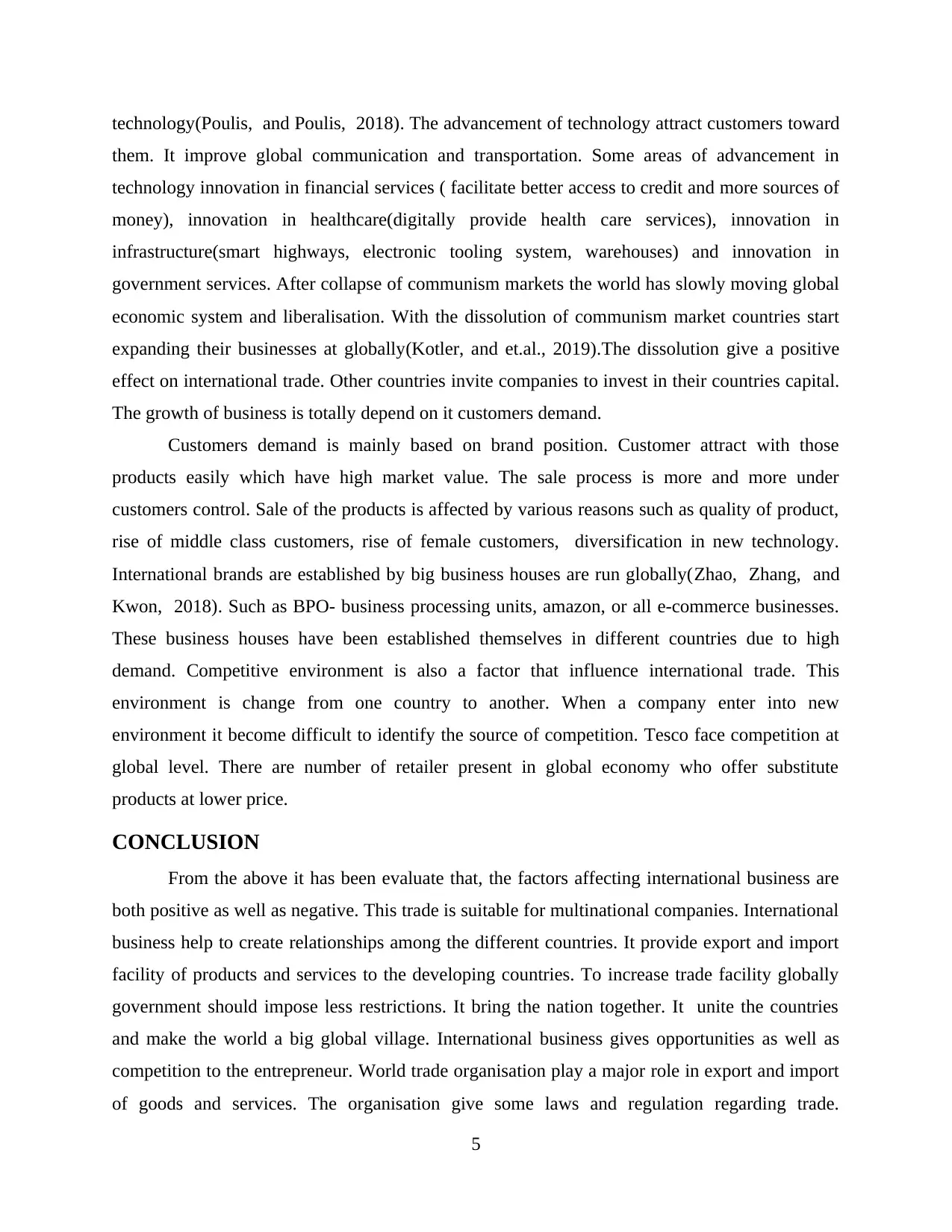
technology(Poulis, and Poulis, 2018). The advancement of technology attract customers toward
them. It improve global communication and transportation. Some areas of advancement in
technology innovation in financial services ( facilitate better access to credit and more sources of
money), innovation in healthcare(digitally provide health care services), innovation in
infrastructure(smart highways, electronic tooling system, warehouses) and innovation in
government services. After collapse of communism markets the world has slowly moving global
economic system and liberalisation. With the dissolution of communism market countries start
expanding their businesses at globally(Kotler, and et.al., 2019).The dissolution give a positive
effect on international trade. Other countries invite companies to invest in their countries capital.
The growth of business is totally depend on it customers demand.
Customers demand is mainly based on brand position. Customer attract with those
products easily which have high market value. The sale process is more and more under
customers control. Sale of the products is affected by various reasons such as quality of product,
rise of middle class customers, rise of female customers, diversification in new technology.
International brands are established by big business houses are run globally(Zhao, Zhang, and
Kwon, 2018). Such as BPO- business processing units, amazon, or all e-commerce businesses.
These business houses have been established themselves in different countries due to high
demand. Competitive environment is also a factor that influence international trade. This
environment is change from one country to another. When a company enter into new
environment it become difficult to identify the source of competition. Tesco face competition at
global level. There are number of retailer present in global economy who offer substitute
products at lower price.
CONCLUSION
From the above it has been evaluate that, the factors affecting international business are
both positive as well as negative. This trade is suitable for multinational companies. International
business help to create relationships among the different countries. It provide export and import
facility of products and services to the developing countries. To increase trade facility globally
government should impose less restrictions. It bring the nation together. It unite the countries
and make the world a big global village. International business gives opportunities as well as
competition to the entrepreneur. World trade organisation play a major role in export and import
of goods and services. The organisation give some laws and regulation regarding trade.
5
them. It improve global communication and transportation. Some areas of advancement in
technology innovation in financial services ( facilitate better access to credit and more sources of
money), innovation in healthcare(digitally provide health care services), innovation in
infrastructure(smart highways, electronic tooling system, warehouses) and innovation in
government services. After collapse of communism markets the world has slowly moving global
economic system and liberalisation. With the dissolution of communism market countries start
expanding their businesses at globally(Kotler, and et.al., 2019).The dissolution give a positive
effect on international trade. Other countries invite companies to invest in their countries capital.
The growth of business is totally depend on it customers demand.
Customers demand is mainly based on brand position. Customer attract with those
products easily which have high market value. The sale process is more and more under
customers control. Sale of the products is affected by various reasons such as quality of product,
rise of middle class customers, rise of female customers, diversification in new technology.
International brands are established by big business houses are run globally(Zhao, Zhang, and
Kwon, 2018). Such as BPO- business processing units, amazon, or all e-commerce businesses.
These business houses have been established themselves in different countries due to high
demand. Competitive environment is also a factor that influence international trade. This
environment is change from one country to another. When a company enter into new
environment it become difficult to identify the source of competition. Tesco face competition at
global level. There are number of retailer present in global economy who offer substitute
products at lower price.
CONCLUSION
From the above it has been evaluate that, the factors affecting international business are
both positive as well as negative. This trade is suitable for multinational companies. International
business help to create relationships among the different countries. It provide export and import
facility of products and services to the developing countries. To increase trade facility globally
government should impose less restrictions. It bring the nation together. It unite the countries
and make the world a big global village. International business gives opportunities as well as
competition to the entrepreneur. World trade organisation play a major role in export and import
of goods and services. The organisation give some laws and regulation regarding trade.
5
Paraphrase This Document
Need a fresh take? Get an instant paraphrase of this document with our AI Paraphraser
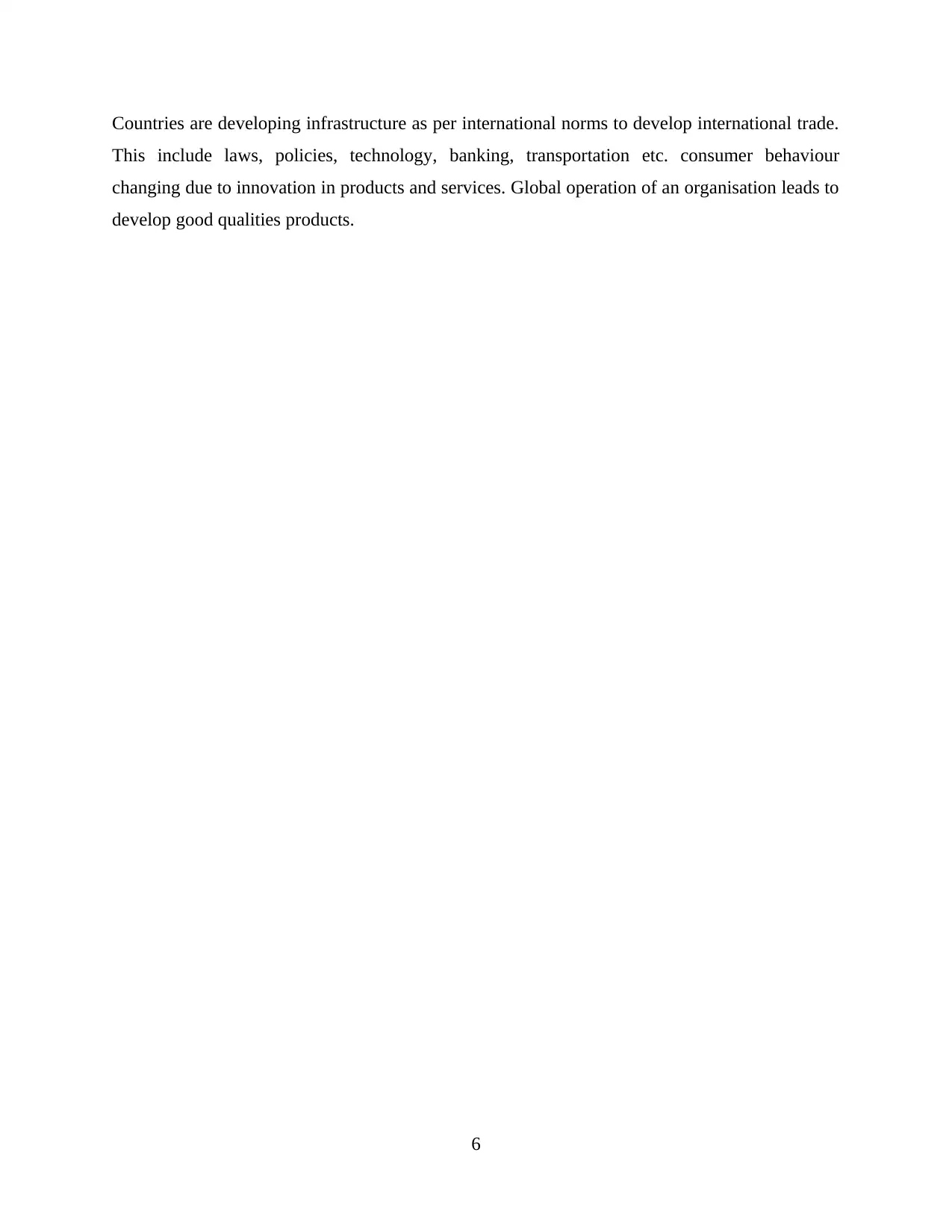
Countries are developing infrastructure as per international norms to develop international trade.
This include laws, policies, technology, banking, transportation etc. consumer behaviour
changing due to innovation in products and services. Global operation of an organisation leads to
develop good qualities products.
6
This include laws, policies, technology, banking, transportation etc. consumer behaviour
changing due to innovation in products and services. Global operation of an organisation leads to
develop good qualities products.
6
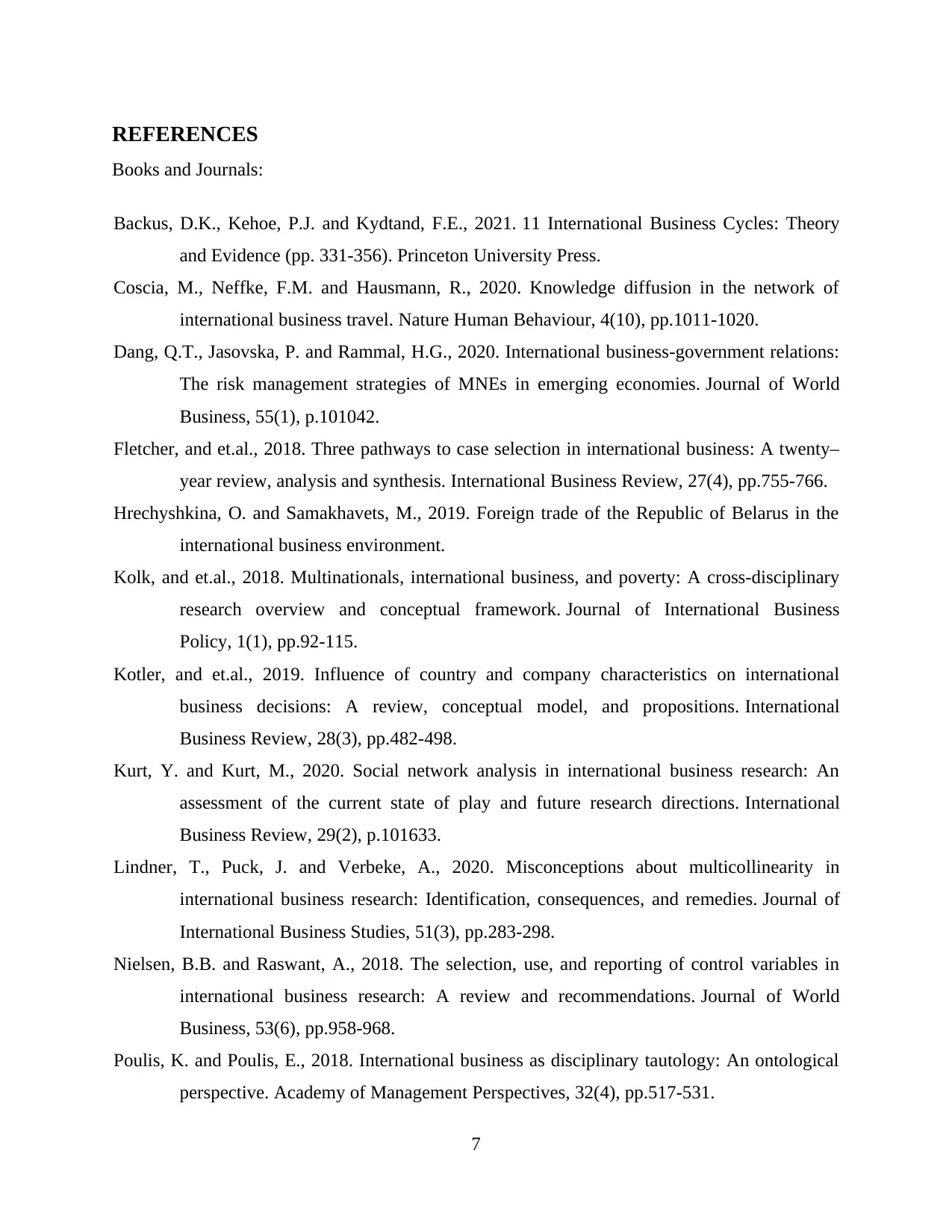
REFERENCES
Books and Journals:
Backus, D.K., Kehoe, P.J. and Kydtand, F.E., 2021. 11 International Business Cycles: Theory
and Evidence (pp. 331-356). Princeton University Press.
Coscia, M., Neffke, F.M. and Hausmann, R., 2020. Knowledge diffusion in the network of
international business travel. Nature Human Behaviour, 4(10), pp.1011-1020.
Dang, Q.T., Jasovska, P. and Rammal, H.G., 2020. International business-government relations:
The risk management strategies of MNEs in emerging economies. Journal of World
Business, 55(1), p.101042.
Fletcher, and et.al., 2018. Three pathways to case selection in international business: A twenty–
year review, analysis and synthesis. International Business Review, 27(4), pp.755-766.
Hrechyshkina, O. and Samakhavets, M., 2019. Foreign trade of the Republic of Belarus in the
international business environment.
Kolk, and et.al., 2018. Multinationals, international business, and poverty: A cross-disciplinary
research overview and conceptual framework. Journal of International Business
Policy, 1(1), pp.92-115.
Kotler, and et.al., 2019. Influence of country and company characteristics on international
business decisions: A review, conceptual model, and propositions. International
Business Review, 28(3), pp.482-498.
Kurt, Y. and Kurt, M., 2020. Social network analysis in international business research: An
assessment of the current state of play and future research directions. International
Business Review, 29(2), p.101633.
Lindner, T., Puck, J. and Verbeke, A., 2020. Misconceptions about multicollinearity in
international business research: Identification, consequences, and remedies. Journal of
International Business Studies, 51(3), pp.283-298.
Nielsen, B.B. and Raswant, A., 2018. The selection, use, and reporting of control variables in
international business research: A review and recommendations. Journal of World
Business, 53(6), pp.958-968.
Poulis, K. and Poulis, E., 2018. International business as disciplinary tautology: An ontological
perspective. Academy of Management Perspectives, 32(4), pp.517-531.
7
Books and Journals:
Backus, D.K., Kehoe, P.J. and Kydtand, F.E., 2021. 11 International Business Cycles: Theory
and Evidence (pp. 331-356). Princeton University Press.
Coscia, M., Neffke, F.M. and Hausmann, R., 2020. Knowledge diffusion in the network of
international business travel. Nature Human Behaviour, 4(10), pp.1011-1020.
Dang, Q.T., Jasovska, P. and Rammal, H.G., 2020. International business-government relations:
The risk management strategies of MNEs in emerging economies. Journal of World
Business, 55(1), p.101042.
Fletcher, and et.al., 2018. Three pathways to case selection in international business: A twenty–
year review, analysis and synthesis. International Business Review, 27(4), pp.755-766.
Hrechyshkina, O. and Samakhavets, M., 2019. Foreign trade of the Republic of Belarus in the
international business environment.
Kolk, and et.al., 2018. Multinationals, international business, and poverty: A cross-disciplinary
research overview and conceptual framework. Journal of International Business
Policy, 1(1), pp.92-115.
Kotler, and et.al., 2019. Influence of country and company characteristics on international
business decisions: A review, conceptual model, and propositions. International
Business Review, 28(3), pp.482-498.
Kurt, Y. and Kurt, M., 2020. Social network analysis in international business research: An
assessment of the current state of play and future research directions. International
Business Review, 29(2), p.101633.
Lindner, T., Puck, J. and Verbeke, A., 2020. Misconceptions about multicollinearity in
international business research: Identification, consequences, and remedies. Journal of
International Business Studies, 51(3), pp.283-298.
Nielsen, B.B. and Raswant, A., 2018. The selection, use, and reporting of control variables in
international business research: A review and recommendations. Journal of World
Business, 53(6), pp.958-968.
Poulis, K. and Poulis, E., 2018. International business as disciplinary tautology: An ontological
perspective. Academy of Management Perspectives, 32(4), pp.517-531.
7
⊘ This is a preview!⊘
Do you want full access?
Subscribe today to unlock all pages.

Trusted by 1+ million students worldwide
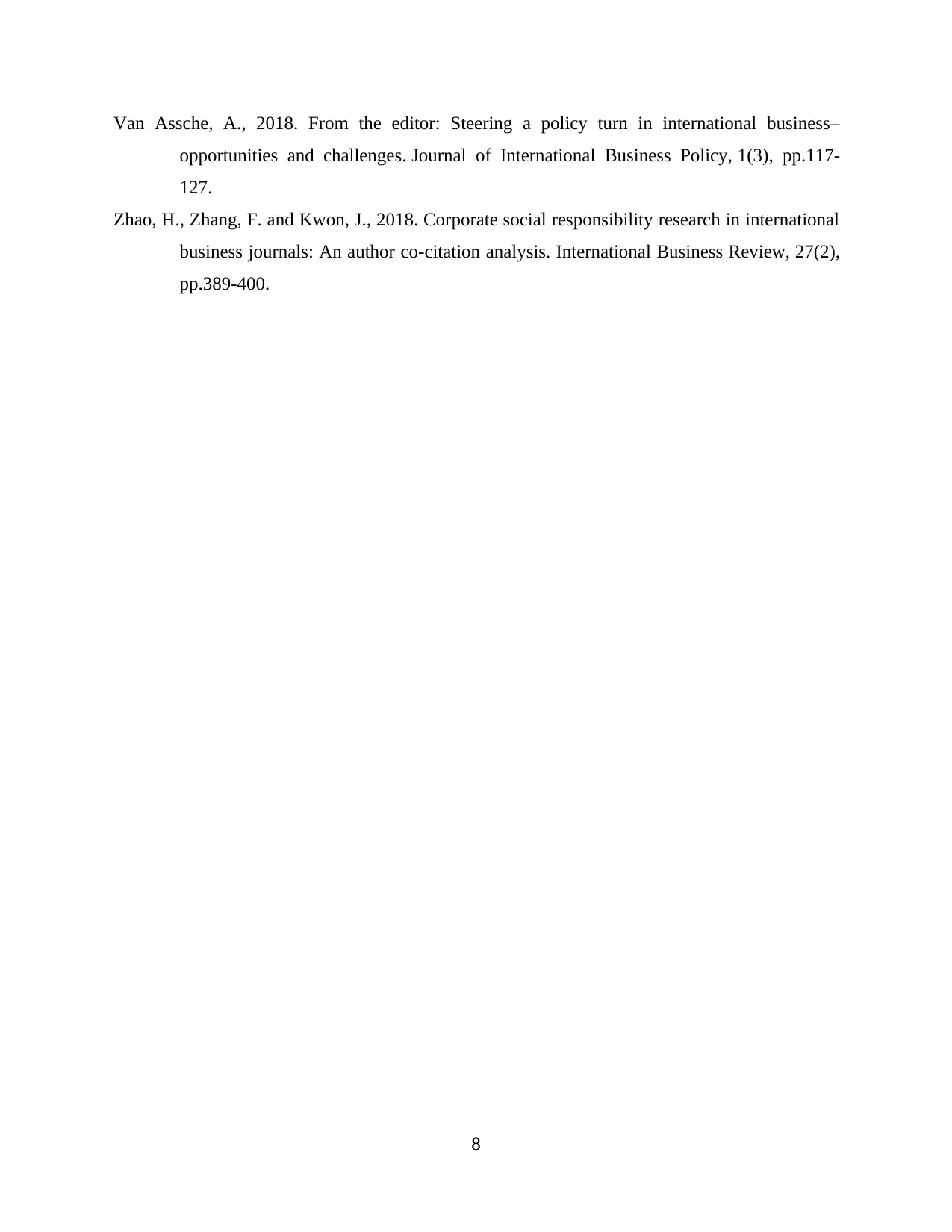
Van Assche, A., 2018. From the editor: Steering a policy turn in international business–
opportunities and challenges. Journal of International Business Policy, 1(3), pp.117-
127.
Zhao, H., Zhang, F. and Kwon, J., 2018. Corporate social responsibility research in international
business journals: An author co-citation analysis. International Business Review, 27(2),
pp.389-400.
8
opportunities and challenges. Journal of International Business Policy, 1(3), pp.117-
127.
Zhao, H., Zhang, F. and Kwon, J., 2018. Corporate social responsibility research in international
business journals: An author co-citation analysis. International Business Review, 27(2),
pp.389-400.
8
1 out of 10
Related Documents
Your All-in-One AI-Powered Toolkit for Academic Success.
+13062052269
info@desklib.com
Available 24*7 on WhatsApp / Email
![[object Object]](/_next/static/media/star-bottom.7253800d.svg)
Unlock your academic potential
Copyright © 2020–2025 A2Z Services. All Rights Reserved. Developed and managed by ZUCOL.




